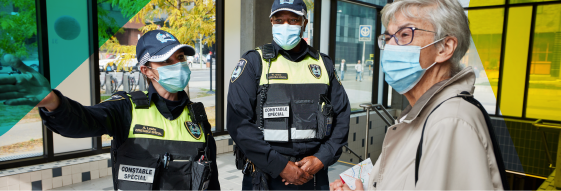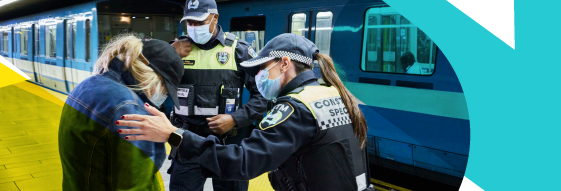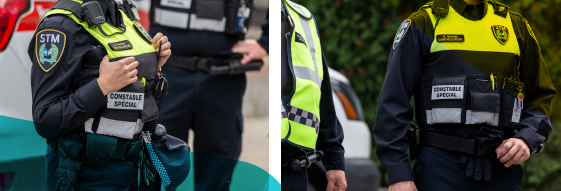A team that gets you where you're going
Special constables patrol the network day and night to ensure everyone’s safety and smooth customer flow, and to make sure that rules are being followed. Prevention and customer support are central to their work. Every day, they defuse a range of small events that could have an impact on bus and métro service.
The Transit Network Security team includes:
- 164 special constables
- 1 superintendent
- 4 captains head of sections
- 7 operations lieutenants
- 2 investigators
- 10 sergeants (operations supervisors)
- 2 lieutenants-instructors certified by the École nationale de police du Québec
- 3 analysts
- 4 prevention officers
Since it’s important to us that the various Montréal communities be represented, 35% of the Transit Network Security team is made up of people from diverse backgrounds. In fact, the members of the team speak 20 different languages.

Would you like to make a comment or complaint about a situation involving a special constable? Contact us through the online form or by phone.
From inspectors to special constables
Since 2021, our inspectors have been gradually trained and sworn in as special constables, a fairly prominent role in public transit in other major Canadian cities, but still relatively unknown in Quebec. This status was key to allowing our teams to fully support our customers and employees. To obtain this peace officer status, the special constables trained at the École nationale de police du Québec, underwent a security accreditation investigation and swore an oath of loyalty and secrecy before a Court of Québec judge.
The following are a few myths about the role of special constables that need to be debunked.
False
It’s true that, at peak periods, they can often be found in the busiest parts of the network, in particular to ensure smooth customer flow. However, they’re always ready to move quickly in the event of problems elsewhere in the network, by métro or by car. And, with a 71-km métro network and 227 bus lines covering an area of 500 km2, monitoring the entire network 24/7 is no easy feat!
During the day and in the evenings, 60% of special constables on duty are assigned to the Centre-West region (which includes the downtown area) and 40% are assigned to the East region. The teams cover the bus and métro networks in each of these two service regions. Overnight, since the métro is closed and fewer bus lines are in operation, the team on duty covers the entire territory. There is also some overlap between work shifts to ensure a constant presence across the entire network, day, evening and night.
If you need help and you can’t find a special constable, approach any STM employee or pick up a telephone at one of the emergency assistance stations on the platforms. Everyone will swing into action to make sure you get the help you need.
True
They undergo a 14-week training period at the École nationale de police du Québec (ÉNPQ) in Nicolet and are professionals who specialize in public transit safety. Although the occupation is not very well known in Quebec, it is no less a source of pride and, most importantly, is not in competition with the occupation of police officer. On the contrary, a complementary approach is adopted to ensure everyone’s safety. The special constables work closely with police services, more specifically the SPVM (Montreal), the SPL (Laval) and the SPAL (Longueuil)

Special constables undergo more specific training that covers, among other things, legal aspects, criminal offences in a context of public transit, criminal law powers and duties, unconscious bias (profiling) and police ethics. Then sworn in before a Court of Québec judge, they become special constables.
To learn more about training for STM inspectors (French only)
False
The hiring and training process prior to obtaining inspector or special constable status is consistent with the role that they will be required to assume: enriching, but very demanding.
We receive an average of 500 applications a year for the job of STM special constable. Of this number, 300 applicants meet the basic requirements (e.g., work experience, education) and are invited to attend an information session. If the applicants are still interested, they undergo a judgement test: that’s the first elimination round! Then, they undergo a physical exam and go through simulations. At this stage, only 50% of applicants successfully move on to the next step: the behavioural interview. A few verification procedures complete the process, and the best candidates are offered a contract, provided they successfully complete the ÉNPQ training.
Only one or two cohorts graduate every year, according to the STM’s needs and the ÉNPQ’s capacity. The entire hiring process is very rigorous: if there is even the slightest doubt, an application can be set aside.
False
 Obviously, special constables are responsible for ensuring that all customers pay their transit fare, but that’s far from their only role. Much of their work involves carrying out preventive interventions that help avert numerous incidents and service disruptions. In 2020, they responded to 31,628 calls for service and issued 5,704 tickets based on fares and regulations regarding conduct.
Obviously, special constables are responsible for ensuring that all customers pay their transit fare, but that’s far from their only role. Much of their work involves carrying out preventive interventions that help avert numerous incidents and service disruptions. In 2020, they responded to 31,628 calls for service and issued 5,704 tickets based on fares and regulations regarding conduct.
They must also:
- Ensure smooth customer flow during peak periods
- Support all customers by working with partners and organizations
- Support employees on the ground, who, at any time, can report a situation to a special constable, who will manage the event
- Play a leading role during service disruptions to control access to the stations and platforms, support customers in the event of an incident and ensure customer flow
- Monitor facilities and ensure that active worksites, tail tracks, mechanical rooms, terminals, parking lots, bus garages and stations, among others, are secured.
In addition, to ensure that each small everyday event is transparent during your trips, they work with a number of internal (e.g., control room, station employees, drivers) and external (e.g., Urgences-santé, SPVM) partners. Special constables will tell you that they never get bored in the network.
False
This new status means that the roles and responsibilities of special constables are changing to better ensure everyone’s safety. The primary mandate of the Transit Network Security team remains the same: to support customers on a daily basis. Special constables can, however, take action in situations where it was impossible to do so before, which improves the response time for customers in need.

A few examples of situations in which special constables can intervene:
- If a customer or an employee is the victim of an assault or a crime, a special constable can arrest the attacker and hand him or her over to the police, based on reasonable grounds.
- If an individual is in crisis and is a risk to his or her own or another person’s safety, a special constable can take action.
- If parked vehicles are obstructing a drop-off area or reserved lanes, special constables can issue tickets or have vehicles towed.
In addition, transparency and legal responsibility are increased, since constables are subject to the Police Act and, consequently, Quebec’s Police Ethics Commissioner. The Bureau des enquêtes indépendantes (BEI) is also able to take over investigations in accordance with the Act. This enhances the rigorous processes already in place internally, in addition to STM employees’ code of conduct.
False

Special constables will be allowed to carry the same equipment as when they were inspectors, namely an extendable baton, which can be used for defensive purposes. In all interventions, the key for our special constables is first and foremost to come to a peaceful resolution by focusing on communication in order to defuse any problem situation.
False
Obviously, we have by-laws, and one of the roles of special constables is to ensure compliance with these by-laws for the sake of everyone’s safety. However, special constables must demonstrate good judgment when dealing with all types of clientele, and homeless people are certainly no exception. In partnership with various teams and stakeholders, the special constables offer assistance and support to vulnerable people.
During major cold spells, we work with different organizations to help those in need and to provide safe transportation for homeless people to emergency shelters.
Also, let's mention that a mixed patrol called Équipe métro d’intervention et de concertation (ÉMIC), a specialized patrol made up of a police officer, an STM special constable and an SDS social worker, are supporting homeless people by guiding them toward the right resources.
True
 When a special constable has reason to believe that you have committed an offence, and you are informed of the alleged offence, you have to identify yourself. Refusing to identify yourself may, under certain circumstances, constitute an obstruction to the special constable’s work, and he or she could detain you until you identify yourself, and issue a ticket for obstruction, in accordance with the laws in effect.
When a special constable has reason to believe that you have committed an offence, and you are informed of the alleged offence, you have to identify yourself. Refusing to identify yourself may, under certain circumstances, constitute an obstruction to the special constable’s work, and he or she could detain you until you identify yourself, and issue a ticket for obstruction, in accordance with the laws in effect.
Are special constables required to identify themselves?
Yes. In addition to having their name inscribed on their vest, special constables have to identify themselves (name and employee number) at a customer’s request. This information is also specified on the ticket, if applicable.
Working together for the safety of all
Special constables work with many teams to ensure safe trips for our customers. Those teams include our safety ambassadors, who support special constables in their daily work in the métro network, as well as the City of Montréal police department (SPVM), which takes over in situations that may require their specific involvement.
There are also the mobile social mediation and intervention team (EMMIS) and métro intervention and cooperation team (EMIC), which help special constables support people in vulnerable situations and direct them to the right resources.
Learn more about the different teams that support our customers as they use our networks

